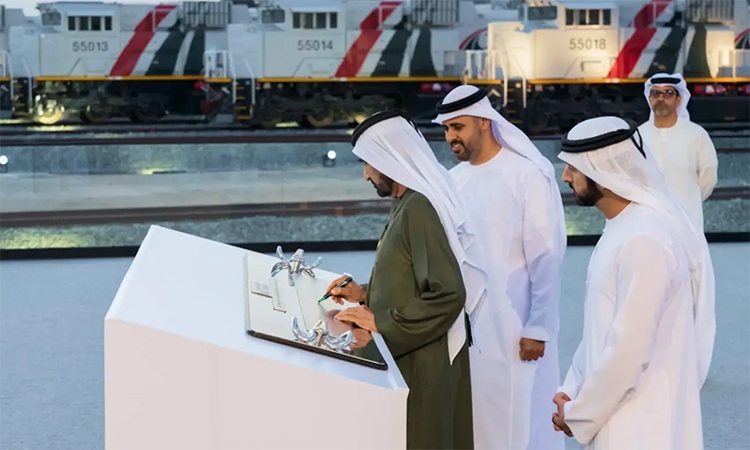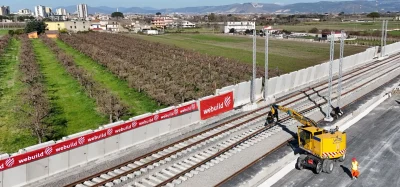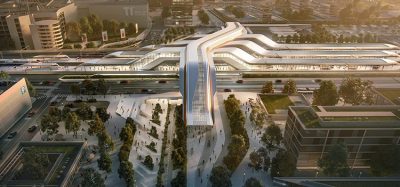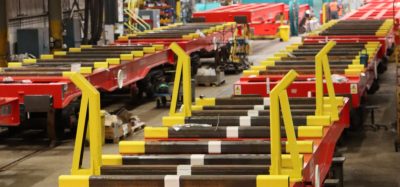UAE launch new national freight network
Posted: 27 February 2023 | Elliot Robinson (Editorial Assistant - Global Railway Review) | No comments yet
Etihad Rail and the United Arab Emirates have officially launched the new transnational freight train network.


Mohammed bin Rashid, Vice President and Prime Minister and Ruler of Dubai, announces the completion of the UAE National Rail Network - Credit: Etihad Rail
The inauguration of the UAE National Railway Network has taken place in the Al Fayah region, Abu Dhabi. The ambitious development project is one of the largest infrastructure projects in the region and aims to link the seven emirates with a main railway network.
The inauguration ceremony was attended by Hamdan bin Mohammed bin Rashid Al Maktoum, Crown Prince of Dubai; Lt. General Saif bin Zayed Al Nahyan, Deputy Prime Minister and Minister of the Interior; Hamed bin Zayed Al Nahyan, Member of the Abu Dhabi Executive Council; Ahmed bin Saeed Al Maktoum, Chairman of Dubai Civil Aviation Authority, Chairman of Dubai Airports and Chairman and Chief Executive of Emirates Airline and Group; Nahyan bin Mubarak Al Nahyan, UAE Minister of Tolerance and Coexistence, and a number of ministers and senior officials.
The network contributes to supporting companies’ businesses and enhancing investment opportunities. The main line of the UAE National Rail Network extends from Ghuweifat on the border of the Kingdom of Saudi Arabia, to Fujairah, forming an essential part of the global supply network. The stage one of the Network has been fully operational since January 2016, where the stage two of the project started in early 2020.
The UAE national railway network will contribute to supporting the national economy at a value of AED200 billion and saving AED8 billion in the cost of road maintenance. The network’s tourism benefits are estimated at AED23 billion. The project has contributed to supporting the local industry by assigning 215 companies and local entities. Also, 70% of the building materials used in the project are produced by the local industry.
The project also supports the UAE’s sustainable development goals and contributes to achieving the UAE Net Zero by 2050, through reducing carbon emissions in the road transport sector by 21%, and reducing road transportation emissions per capita by 40%, by 2050.
The UAE national railway network passes through a variety of geographical terrains, within a large-scale engineering plan that includes the construction of 593 bridges and crossings of all types, and nine tunnels with a length of 6.5km. It took 120 million cubic metres of excavation work to complete, to ensure the highest levels of vehicular traffic flow under the tracks of the railway network.
Related content you will enjoy:
Oman-UAE rail network project discussed at inaugural meeting
Etihad Rail complete tracklaying work on UAE main line in Sharjah and Ras Al Khaimah
The freight trains
The fleet of the most modern freight trains in the region includes 38 locomotives, with a capacity of 60 million tonnes of goods annually, and more than 1,000 multi-purpose vehicles. Each goods transport’s locomotive operates with a power of 4,500 horsepower, equivalent to 3,400 kilowatts. It is one of the most powerful freight train engines in the Middle East.
The freight trains will run up to 120km/h. The standard width of the rail is 1,435 metres, and it operates under the European ETCS level 2 signalling system. It has been specially designed to withstand the geographical nature, climatic conditions, high temperatures and humidity in the GCC region, to ensure high levels of performance, efficiency and sustainability. The freight trains will connect four major ports. It will include seven logistics centres across the country, to serve trains and related businesses.
The network also includes a number of charging stations located in Ruwais, Industrial City of Abu Dhabi (ICAD), Khalifa Port, Dubai Industrial City, Jebel Ali Port, Al Ghail and Fujairah Port. These locations are a major hub for local and regional distribution and logistics services, as it includes customs warehouses and on-site cargo inspection services.
The UAE National Railway Network will provide solutions for investors and customers, due to its ability to transport all types of goods, including petrochemicals, raw steel, limestone, cement, building materials, industrial and domestic waste, aluminium, food commodities, and general cargo.






